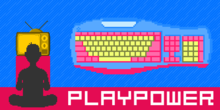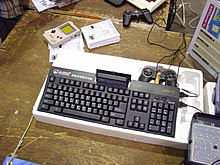| Founded | 2008 |
|---|---|
| Founder | Derek Lomas, Daniel Rehn, Jeremy Douglass |
| Type | Non-profit organization video game industry |
| Purpose | educational games |
| Location | |
| Website | http://www.playpower.org |

PlayPower is a non-profit organization designed to create free educational computer software for low income families in India and other developing countries. After 2012 the project was reformed as PlayPower Labs, LLC, which focuses now on educational games for mobile platforms.
Concept

The games are designed to run on 8-bit systems, using designs and processors that are in the public domain e.g. Famicom clones which patents have expired, which allows the games to be run on very low cost computers. For $12, families can buy a compatible computer with an 8-bit, 6502 processor, a keyboard, a slot for game cartridges, a mouse, and two game controllers. Lacking its own monitor, the computer plugs into a TV screen for display. Part of the software should be acquired as source code of commercially unavailable educational games, like Number Munchers and Lemonade Stand, and ported by the open-source community.
At least three games were in production as of early 2010, "Hanuman Typing warrior", "Hanuman's Quiz Adventure" and the "Mosquito game". The project opened the source code for these three games, written in assembly. One of them teaches players how to type, which can greatly improve their earning potential in the job market. Another is a multiple choice question game, somewhat similar to that featured in the film Slumdog Millionaire. And finally, a different game was created to raise awareness of malaria (which infects 1.5 million people a year in India) by allowing players to kill mosquitoes and accumulate points toward antimalarial mosquito nets.
History
The organization was founded in 2008 by Derek Lomas and Daniel Rehn Archived 2009-01-29 at the Wayback Machine, who were students at the University of California at San Diego at the time, and Jeremy Douglass, a postdoctoral research fellow at the same school at the time.
In 2012 Daniel Rehn announced on his private homepage the PowerPlay project as "finished".
After 2012 the Playpower project was transformed to "Playpower Labs, LLC" and offers now mobile platform educational games via Apple's iTunes store and Google's play store.
Reception
PlayPower won the MacArthur Foundation's Digital Media and Learning Competition in 2009, for which it received $180,000 to help fund its activities. More than 100 volunteer programmers from around the world have signed up to help develop games.
The project was noted in the academic domain and by the web community like BoingBoing.
See also
References
- ^ About the $10 Computer and Playpower by Derek Lomas (2010)
- ^ Old-style computers get new life in developing countries, Pittsburgh Post-Gazette, February 10, 2010 Wayback
- ^ $12 Computer: Playpower Wants to Save the World 8 Bits at a Time, Wired, March 11, 2009
- playpowerorg.ning.com (archived 2010)
- Introducing the “$10 Computer” DESIGN CASE STUDY 1:“HANUMAN, TYPING WARRIOR” Designing Appropriate Educational Games for a $10 Computer in India by Kishan Patel 1, Ashita Dadlani 2, Manushree Vijayvergiya 3, Aman Jain 3, Harshit Daga 3, Jay Panda 3, Vipul Raheja 3 and Derek Lomas, 1 Dhirubhai Ambani Institute of Information and Communication Technology, 2 Netaji Subhas Institute of Information Technology, 3 International Institute of Information Technology Hyderabad, 4 Carnegie Mellon University, USA
- Games from Playpower's workshop in India by James Lomas (on January 24, 2010)
- Playpower Foundation (2008–2012) Archived 2017-10-26 at the Wayback Machine on danielrehn.com "An open-source community for designing and distributing learning games to ultra-affordable computers in developing regions."
- Mathworld on itunes.apple.com
- Playpower on play.google.com
- playpower-80s-computing-21st-century on theguardian.com (2009-11-04)
- 8-bit-computer-now-available-for-all-your-homebrewing-needs on Engadget (April 31, 2009)
- "The power of play: design lessons for increasing the lifespan of outdated computers." by Derek Lomas, Anuj Kumar, Kishan Patel, Dixie Ching, Meera Lakshmanan, Matthew Kam. DOI: 10.1145/2470654.2481379. Conference: Proceedings of the SIGCHI Conference on Human Factors in Computing Systems, aka Proceedings of ACM Conference on Human Factors in Computing Systems (CHI ’13), Paris, France (April 27-May 2, 2013)
- "10 PRINT CHR$(205.5+RND(1)); : GOTO 10" Archived 2013-08-18 at the Wayback Machine MIT Press book, ISBN 9780262305501, by Nick Montfort, Patsy Baudoin, John Bell, Ian Bogost, Jeremy Douglass, Mark C. Marino, Michael Mateas, Casey Reas, Mark Sample, and Noah Vawter. "All royalties from the sale of this book are being donated to PLAYPOWER, a nonprofit organization that supports affordable, effective, fun learning games. PLAYPOWER uses a radically affordable TV-computer based on the 6502 processor (the same chip that was used in the Commodore 64) as a platform for learning games in the developing world." (2013)
- "Connecting Computer-Supported Collaborative Learning to Policy and Practice: CSCL2011 Conference Proceedings" 9th Intl Computer-Supported Collaborative Learning Conf, July 4th-8th, 2011, in Hong Kong. Published as part of, Volume 2, publisher International Society of the Learning Sciences (isls.org), editors Hans Spada / Gerry Stahl / Naomi Miyake / Nancy Law (2011)
- The gaming computer you dreamed of in 1983 by Rob Beschizza on BoingBoing (Mar 27, 2009) Wayback Machine
External links
- Official website
- Hanuman Typing Warrior NES game and source code on groups.google.com